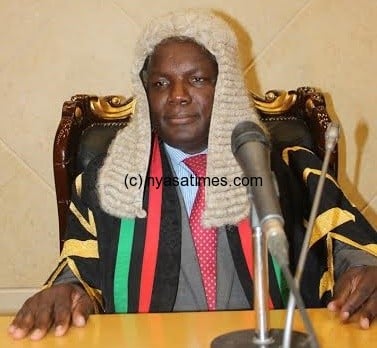![Lawyer Salimu]()
Malawian lawyer, Ambokire Salimu has taken a bold move and dragged Malawi Electoral Commission (Mec) to court to influence electoral law reform that would ensure elected public officers are bound by their campaign promises.
[caption id="attachment_104010" align="alignright" width="580"]
![Lawyer Salimu]()
Lawyer Salimu[/caption]
Salimu, in an individual capacity, filed for Leave for Judicial Review at the High Court in Blantyre to push for Mec to refer Parliamentary and Presidential Elections Act, Political Parties Act and Local Government Elections Act to the Law Commission for review to incorporate a provision that specifically calls public officers elected through universal suffrage to be legally bound by promises they make to voters.
According to the Constitution, the authority to govern the country derives from the people of Malawi; surprisingly, there is no clause in the country’s electoral laws that place any direct legal obligation on those seeking public office through ballot to fulfill promises they make to electorate during campaign period.
The court has set Thursday next week when the application for Leave for Judicial Review will be heard. If granted, the court, based on Salimu’s application, is expected to issue an ex-parte Order of interlocutory Injunction, restraining Mec from conducting elections in the country until the outcome of the Judicial Review.
Application for Judicial Review
Salimu told
Nyasa Times that he decided to take the board step and push for electoral law reform, arguing as a Malawian citizen he is directly affected by the ‘status quo he seeks to reverse’.
Salimu argued that those who seek public office through elections do so, on the basis of express promises made to the people, including himself, and yet there is no statutory provision that binds them to
deliver on such premises.
“As a voter and citizen of Malawi, I give the holders of public office through elections their legal validation. It is a legitimate expectation that these public officers shall deliver on their campaign promises,” argued Salimu.
He added: “Section 6 of the Constitution expressly says that all authority to govern derives from the people yet the legislation under which the electoral commission has continued to conduct elections does not bind those seeking election to public office to their campaign promises”.
He cited the example of the ruling Democratic Progressive Party (DPP) which promised during campaign period to reduce presidential powers in respect of the appointment of the directors for institutions like the Anti-Corruption Bureau (ACB), once elected.
The promise was even highlighted in the party’s printed manifesto, page 12 (paragraph xiv) and page 27 (paragraph xiii), dubbed Towards People-Centered Government.
However, the party has used its majority members in Parliament to defeat private members’ bill that sought to amend the Corrupt Practices Act to align with the exact promises the party made.
Salimu was quick to point out that the case is not against DPP but the electoral laws.
“This is not about DPP as a party, no. What happened in the National Assembly vis-avis the private members’ bill to amend the Corrupt Practices Act is an example of eventualities arising out of the lack
of express statutory prescription biding those who seek public office to be bound their campaign promises,” further argued Salimu.
Why MEC
Salimu said the electoral commission mandate goes beyond just holding of elections in Malawi as stipulated in Section 76 (2)(d), adding the Section places Constitutional obligation on the commission to ensure the elections in this country are, in all aspects, in compliance with the Constitution.
“It is therefore important that all laws governing elections in the country are in tandem with the ultimate constitutional provisions; the same Constitution that expressly provides in Section 6 that the
authority to govern comes from the people of Malawi,” he said.
He said it was incumbent on the electoral commission to initiate such electoral law reform that would uphold the constitutional prescription.
“In Sub-section (2) the electoral commission is required to freely communicate with government and any political party or candidate, person or organization; I therefore would like it to communicate with
the Law Commission to review and synchronize our electoral laws with especially Section 6 of the Constitution”.
In Malawi politicians have for long time being accused of failing to uphold promises made to the public in order to win votes.
Meanwhile, Mec is in the process of undertaking reforms which, among other things, will see re-demarcation of wards and constituencies, adoption and use of the biometric voter registration system in the future elections and the use 50+1 System in identifying the winner especially for president.
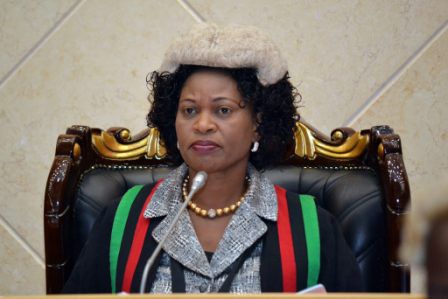
 Deputy speaker Esther Mcheka Chilenje: Illegal allowances[/caption]
ACB deputy director Reneck Matemba said the report will be made available in the coming weeks.
Mcheka –Chilenje and Chiwaya were accused that they swindled Parliament money through dubious claims since their election to the high offices.
They allegedly pocket K500, 000 each every month for house allowances, K250,000 more than their entitlement as they live in their personal houses.
"We have concluded the report and we have made recommendations. The report will be released to the public in the coming days or weeks but very soon," he said.
Matemba said apart from the two deputy speakers, ACB also interrogated Speaker Richard Msowoya because issues of Parliamentary Service Commission came up during the interrogation of the two deputy speakers who survived pressure from the back benchers to resign.
"We want this matter to come to an end, we are keen on this" he said.
Chilenje went into parliament as an independent MP having failed to win Democratic Progressive Party primary elections in the run up to the 2014 elections but now she returned to her former party whilst Chiwaya is a United Democratic Front MP, a party which is a bedfellow of the DPP in parliament.
Legal and constitutional commentator Edge Kanyongolo demanded that the deputy speakers should pay back what they unjustly got from taxpayers to avoid setting a bad precedent for future occupants of the office.
Parliamentary Service Commission (PSC) ordered that they no longer get rentals.
Deputy speaker Esther Mcheka Chilenje: Illegal allowances[/caption]
ACB deputy director Reneck Matemba said the report will be made available in the coming weeks.
Mcheka –Chilenje and Chiwaya were accused that they swindled Parliament money through dubious claims since their election to the high offices.
They allegedly pocket K500, 000 each every month for house allowances, K250,000 more than their entitlement as they live in their personal houses.
"We have concluded the report and we have made recommendations. The report will be released to the public in the coming days or weeks but very soon," he said.
Matemba said apart from the two deputy speakers, ACB also interrogated Speaker Richard Msowoya because issues of Parliamentary Service Commission came up during the interrogation of the two deputy speakers who survived pressure from the back benchers to resign.
"We want this matter to come to an end, we are keen on this" he said.
Chilenje went into parliament as an independent MP having failed to win Democratic Progressive Party primary elections in the run up to the 2014 elections but now she returned to her former party whilst Chiwaya is a United Democratic Front MP, a party which is a bedfellow of the DPP in parliament.
Legal and constitutional commentator Edge Kanyongolo demanded that the deputy speakers should pay back what they unjustly got from taxpayers to avoid setting a bad precedent for future occupants of the office.
Parliamentary Service Commission (PSC) ordered that they no longer get rentals.

 Chilima visits flooded area[/caption]
[caption id="attachment_107497" align="alignright" width="600"]
Chilima visits flooded area[/caption]
[caption id="attachment_107497" align="alignright" width="600"]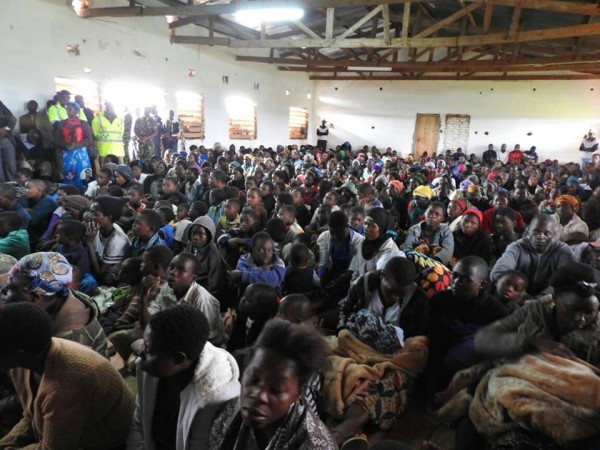 Flood victims in Mzuzu[/caption]
[caption id="attachment_107498" align="alignright" width="600"]
Flood victims in Mzuzu[/caption]
[caption id="attachment_107498" align="alignright" width="600"] House destroyed by floods[/caption]
The Mzuzu floods are as a result of the 10 day persistent rains in the northern region city leading to six deaths, injuring 10, destroying over 1000 houses and affecting about 17,000 families.
Ironically, during the tour, it was the Vice President who insisted to visit all the heavily affected areas before he launched government relief items response to the disaster.
As Minister for Disaster and Management Affairs, the veep accompamied by government officials and communities, went as deep as Kauwa where the floods were catastrophic killing six peole and destroying several houses.
Chilima met all the bereaved families, condoling and giving them words of encouragement as they sailed through the trying times.
Speaking at Masasa where scores of people are being housed in a church, the Vice President said he was sent by President Mutharika to appreciate the situation and cordinate the response operation.
The VP said he had come along with relief items from government that included maize flour, tinned beef, soap, salt, sugar and blankets and made a symbolic donation at two camps.
He then appealed to the people to relocate to upland to avoid such disasters in future, saying such catastrophes affect the national budget and there was need to opt for preventive measures.
"It is not a good thing that every year we should be facing similar calamities that can be avoided if we all decide to move to upland areas. As government, we will do our part and as citizens you should also do your part,"said the Vice President
A representative of the victims, thanked government for the quick response since the disaster struck and appealed to more well wishers to join government efforts.
Mayor for Mzuzu, MP for the city and councillors thanked government for the swift response, saying this demonstrates the unity that this country enjoys.
The VP was scheduled to proceed to Rumphi and Karonga from using a rescue operation helcopter but the plan was shelved due to bad weather.
House destroyed by floods[/caption]
The Mzuzu floods are as a result of the 10 day persistent rains in the northern region city leading to six deaths, injuring 10, destroying over 1000 houses and affecting about 17,000 families.
Ironically, during the tour, it was the Vice President who insisted to visit all the heavily affected areas before he launched government relief items response to the disaster.
As Minister for Disaster and Management Affairs, the veep accompamied by government officials and communities, went as deep as Kauwa where the floods were catastrophic killing six peole and destroying several houses.
Chilima met all the bereaved families, condoling and giving them words of encouragement as they sailed through the trying times.
Speaking at Masasa where scores of people are being housed in a church, the Vice President said he was sent by President Mutharika to appreciate the situation and cordinate the response operation.
The VP said he had come along with relief items from government that included maize flour, tinned beef, soap, salt, sugar and blankets and made a symbolic donation at two camps.
He then appealed to the people to relocate to upland to avoid such disasters in future, saying such catastrophes affect the national budget and there was need to opt for preventive measures.
"It is not a good thing that every year we should be facing similar calamities that can be avoided if we all decide to move to upland areas. As government, we will do our part and as citizens you should also do your part,"said the Vice President
A representative of the victims, thanked government for the quick response since the disaster struck and appealed to more well wishers to join government efforts.
Mayor for Mzuzu, MP for the city and councillors thanked government for the swift response, saying this demonstrates the unity that this country enjoys.
The VP was scheduled to proceed to Rumphi and Karonga from using a rescue operation helcopter but the plan was shelved due to bad weather.
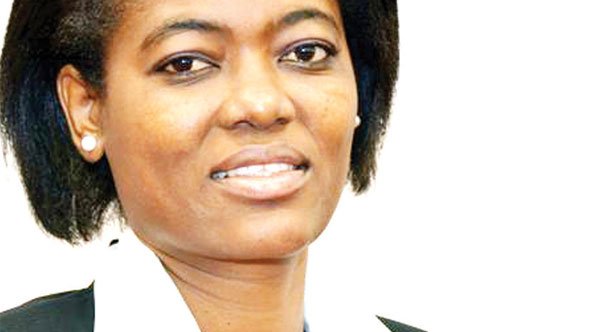
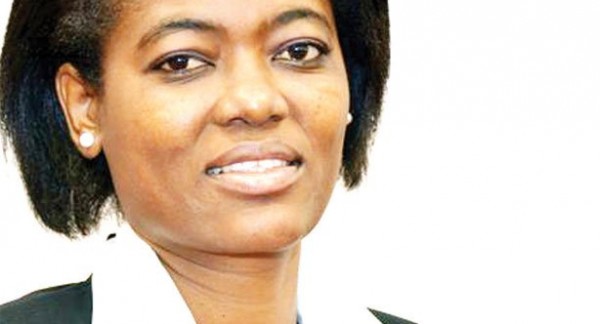 Lunguzi: Poor healthcare in Malawi[/caption]
Lunguzi was speaking during a Health Reform Symposium Agenda meeting held on Friday in Lilongwe.
She made the remarks after the Parliamentary Health Committee made field trips to various districts in the country to appreciate quality of health service delivery.
“When we made the field trips to various district offices, District Health Officers were complaining of inadequate funding, For example the time we visited Salima District Hospital they had received 40 percent of the amount they are supposed to receive for their monthly allocation,” she said
Lunguzi said due to lack of funding ambulances were not operational because of fuel problems adding that only maternal health and child health sections were prioritized when it came to using of ambulances.
“Other patients who are not in the category of maternal and child health had to put fuel in ambulances if they wanted to be transferred anywhere, this is absurd if we think of how hard finances are for people in rural areas,” she explained
She also noted that in the districts they visited there was a challenge of maintaining hospital equipments that were not functioning for example in most districts we visited Radiology equipments were not functioning, the problem being failure to maintain the equipments.
“Imagine a District Hospital not having an X-Ray machine because it is not functioning. Patients are being sent to private hospitals to get services that are supposed to be given to them for free but they have to pay more than 5000 to be scanned,” she said
Minister of Health Peter Kumpalume said his ministry is going under reformatory process and some of the challenges that the Parliamentary Committee on health raised will be addressed by the reforms.
“We have reforms currently which we have targeted until July 1 to start seeing change in the Ministry of health and the challenges highlighted by the committee will be dealt with accordingly and some of these issues are being taken care of as we speak,” he said.
Kumpalume commended the parliamentary committee on health for embarking on the project of field trips and he said the findings were vital to the improvement of the health sector but he was quick to note that his ministry was already aware of them.
He said the biggest challenge in the health sector was not money but rather the attitude and self discipline that health workers have.
Kumpalume said every health practitioner who misbehaves while he is still minister will be dealt with and no one will be transferred without being punished but they will be punished there and then where they are.
“We need change of attitude and how we perceive issues a District Hospital can have funding but if the DHOs mindset is bad and corrupt the funding will never be adequate not matter how the government can try to increase the funding allocation,” he said.
Lunguzi: Poor healthcare in Malawi[/caption]
Lunguzi was speaking during a Health Reform Symposium Agenda meeting held on Friday in Lilongwe.
She made the remarks after the Parliamentary Health Committee made field trips to various districts in the country to appreciate quality of health service delivery.
“When we made the field trips to various district offices, District Health Officers were complaining of inadequate funding, For example the time we visited Salima District Hospital they had received 40 percent of the amount they are supposed to receive for their monthly allocation,” she said
Lunguzi said due to lack of funding ambulances were not operational because of fuel problems adding that only maternal health and child health sections were prioritized when it came to using of ambulances.
“Other patients who are not in the category of maternal and child health had to put fuel in ambulances if they wanted to be transferred anywhere, this is absurd if we think of how hard finances are for people in rural areas,” she explained
She also noted that in the districts they visited there was a challenge of maintaining hospital equipments that were not functioning for example in most districts we visited Radiology equipments were not functioning, the problem being failure to maintain the equipments.
“Imagine a District Hospital not having an X-Ray machine because it is not functioning. Patients are being sent to private hospitals to get services that are supposed to be given to them for free but they have to pay more than 5000 to be scanned,” she said
Minister of Health Peter Kumpalume said his ministry is going under reformatory process and some of the challenges that the Parliamentary Committee on health raised will be addressed by the reforms.
“We have reforms currently which we have targeted until July 1 to start seeing change in the Ministry of health and the challenges highlighted by the committee will be dealt with accordingly and some of these issues are being taken care of as we speak,” he said.
Kumpalume commended the parliamentary committee on health for embarking on the project of field trips and he said the findings were vital to the improvement of the health sector but he was quick to note that his ministry was already aware of them.
He said the biggest challenge in the health sector was not money but rather the attitude and self discipline that health workers have.
Kumpalume said every health practitioner who misbehaves while he is still minister will be dealt with and no one will be transferred without being punished but they will be punished there and then where they are.
“We need change of attitude and how we perceive issues a District Hospital can have funding but if the DHOs mindset is bad and corrupt the funding will never be adequate not matter how the government can try to increase the funding allocation,” he said.

 President Mutharika at the tobbaco auction floors in Lilongwe[/caption]
[caption id="attachment_107552" align="alignright" width="600"]
President Mutharika at the tobbaco auction floors in Lilongwe[/caption]
[caption id="attachment_107552" align="alignright" width="600"]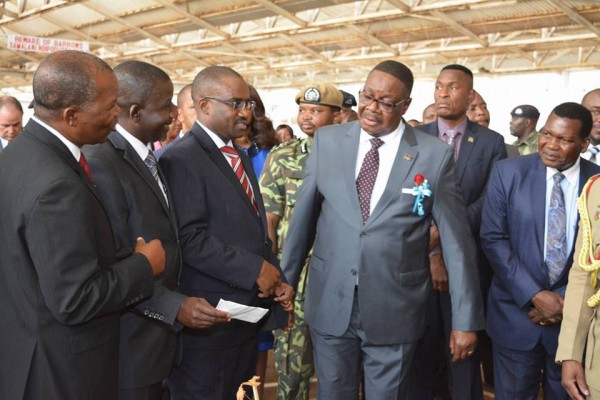 Mutharika at the auction floors for tobacco[/caption]
Mutharika expressed the sentiments at Kanengo in the capital Lilongwe Wednesday where he officially launched the 2016 Tobacco Marketing Season.
He said he was aware of the many challenges the players in the industry, especially “farmers”, were facing and assured that he would “iron them out.”
The President noted that tobacco was important in driving the country’s economy and as such it needed to be well supported.
“Tobacco is a very serious matter. It has been the life of our economy, our life. More than ever, our tobacco industry faces challenges we have never known before. They are challenges we must face and conquer together,” said Mutharika.
He warned some tobacco associations who are charging unjustified and exorbitant “levies and taxes” on farmers saying he would take them to task for their wrongdoing.
He asked the associations to be “fair” when plying their trade.
Taking to the buyers, Mutharika said much as there is always a call for fair prices every year, the buyers never walk the talk.
He made it clear that his government would make sure that farmers get what they deserve for their hard work.
Mutharika promised that his administration will create better regulation of the industry; provide affordable fertilizer for the farmers and protect farmers by investing in drought and climate change mitigation.
Board chairperson of Tobacco Control Commission (TCC), regulators of tobacco sale in Malawi, Inkosi ya Makosi M’belwa V said “a number of reformations were being made to bring about more glory to the tobacco industry.”
Tobacco, popularly known as the green gold in Malawi, is the country’s largest foreign exchange earner at about seventy per cent.
Despite worldwide anti-smoking campaigns, Malawi has vowed to keep on producing the cash crop.
The opening of tobacco marketing season brings a ray of hope that this will improve the ever dwindling economy which has pushed the cost of life drastically up in this poor nation.
TCC say they will ensure that there is no tobacco that slips through the borders to Zambia or Mozambique as has been the case years back during the season.
TCC chief Executive Officer Alfred Changaya said his organisation has teamed up with the police to ensure frequent border patrols to combat the vice.
"We will confisticate all tobacco being smuggled and that will remain the property of the government. We will also impound all vehicles involved in the smuggling," said Changaya.
He said the Limbe Auction Floors open on April 18 and Mzuzu opens its tobacco market on April 20. Tobacco markets rake in billions of money through forex which helps grow the economy.
Mutharika at the auction floors for tobacco[/caption]
Mutharika expressed the sentiments at Kanengo in the capital Lilongwe Wednesday where he officially launched the 2016 Tobacco Marketing Season.
He said he was aware of the many challenges the players in the industry, especially “farmers”, were facing and assured that he would “iron them out.”
The President noted that tobacco was important in driving the country’s economy and as such it needed to be well supported.
“Tobacco is a very serious matter. It has been the life of our economy, our life. More than ever, our tobacco industry faces challenges we have never known before. They are challenges we must face and conquer together,” said Mutharika.
He warned some tobacco associations who are charging unjustified and exorbitant “levies and taxes” on farmers saying he would take them to task for their wrongdoing.
He asked the associations to be “fair” when plying their trade.
Taking to the buyers, Mutharika said much as there is always a call for fair prices every year, the buyers never walk the talk.
He made it clear that his government would make sure that farmers get what they deserve for their hard work.
Mutharika promised that his administration will create better regulation of the industry; provide affordable fertilizer for the farmers and protect farmers by investing in drought and climate change mitigation.
Board chairperson of Tobacco Control Commission (TCC), regulators of tobacco sale in Malawi, Inkosi ya Makosi M’belwa V said “a number of reformations were being made to bring about more glory to the tobacco industry.”
Tobacco, popularly known as the green gold in Malawi, is the country’s largest foreign exchange earner at about seventy per cent.
Despite worldwide anti-smoking campaigns, Malawi has vowed to keep on producing the cash crop.
The opening of tobacco marketing season brings a ray of hope that this will improve the ever dwindling economy which has pushed the cost of life drastically up in this poor nation.
TCC say they will ensure that there is no tobacco that slips through the borders to Zambia or Mozambique as has been the case years back during the season.
TCC chief Executive Officer Alfred Changaya said his organisation has teamed up with the police to ensure frequent border patrols to combat the vice.
"We will confisticate all tobacco being smuggled and that will remain the property of the government. We will also impound all vehicles involved in the smuggling," said Changaya.
He said the Limbe Auction Floors open on April 18 and Mzuzu opens its tobacco market on April 20. Tobacco markets rake in billions of money through forex which helps grow the economy.

 Digital Migration[/caption]
This development has also coincided with the launch of Malawi Digital Television at Mzuzu on 23rd April, 2016.
According to a statement made available to Nyasa Times, Malawi government through the Ministry of Information, Tourism and Civic Education is encouraging all television viewers to acquire the Malawi Digital Television Decoder also known as “KILIYE KILIYE” which will be unveiled during the launch in order to enjoy better quality television and more free channels.
“The channels viewers will access include; Malawi Broadcasting Corporation (MBC) Luso, God News Broadcasting Services (GBS), Timveni, Luntha, Channel for All Africa (CAN), Calvary (CFC), Times, Hope, Zodiak, Joy, Matindi, Ufulu, Beta, Ufulu, Angaliba, African Bible College (ABC) and Laura Televisions,” reads the statement in part.
It further added, “The decoder is not the same as a satellite pay TV or any other Free-To-Air decoder because it enables Malawians to watch more free local television channels with better quality and once the decoder is bought, there is no subscription payment to be made.”
In 2015, Malawi joined the rest of the world in migrating from Analogue to Digital Television Broadcasting.
Digital Migration Project Coordinator Dennis Chirwa said 17th June 2015, analogue transmission automatically cease to function in some parts of the country.
“We have arranged a series of events to bring this information to Malawians so that everyone else should be quick to respond to the migration, Mzuzu, Lilongwe and Blantyre is in the mapping of our informative forums,” said the Coordinator.
Digital broadcasting is a project falling under the Ministry of Information, Tourism and Culture which had already appealed to the general public, television broadcasters and television equipment suppliers to unanimously migrate from analogue to digital transmission.
Digital Migration[/caption]
This development has also coincided with the launch of Malawi Digital Television at Mzuzu on 23rd April, 2016.
According to a statement made available to Nyasa Times, Malawi government through the Ministry of Information, Tourism and Civic Education is encouraging all television viewers to acquire the Malawi Digital Television Decoder also known as “KILIYE KILIYE” which will be unveiled during the launch in order to enjoy better quality television and more free channels.
“The channels viewers will access include; Malawi Broadcasting Corporation (MBC) Luso, God News Broadcasting Services (GBS), Timveni, Luntha, Channel for All Africa (CAN), Calvary (CFC), Times, Hope, Zodiak, Joy, Matindi, Ufulu, Beta, Ufulu, Angaliba, African Bible College (ABC) and Laura Televisions,” reads the statement in part.
It further added, “The decoder is not the same as a satellite pay TV or any other Free-To-Air decoder because it enables Malawians to watch more free local television channels with better quality and once the decoder is bought, there is no subscription payment to be made.”
In 2015, Malawi joined the rest of the world in migrating from Analogue to Digital Television Broadcasting.
Digital Migration Project Coordinator Dennis Chirwa said 17th June 2015, analogue transmission automatically cease to function in some parts of the country.
“We have arranged a series of events to bring this information to Malawians so that everyone else should be quick to respond to the migration, Mzuzu, Lilongwe and Blantyre is in the mapping of our informative forums,” said the Coordinator.
Digital broadcasting is a project falling under the Ministry of Information, Tourism and Culture which had already appealed to the general public, television broadcasters and television equipment suppliers to unanimously migrate from analogue to digital transmission.

 Airtel Malawi's Corporate Social Responsiblity Manager Norah Chavula (R) hands over the cheque to Hastings Bwande of Hope for the Blind. Pic by Brian Itai,[/caption]
Speaking when making the donation in Lilongwe, Airtel Malawi's Corporate Social Responsibility Manager, Norah Chavula said the intervention underlines Airtel’s commitment to empower the underprivileged in the attainment of education.
“We all know that education is not a cheap commodity. Actually education is an investment. Airtel is facilitating the attainment of this precious investment and commodity through a donation of fees.
“Education is one such tool that dissolves our inabilities into abilities. Education empowers and grooms us into intellectuals that capitalize on the best ever human capital, and that is the brain. As long as our brain functions we have what it takes to be as productive as everyone else,” said Chavula.
Chavula said as Airtel they shall keep on finding means and ways of addressing challenges faced by visually impaired and blind students in the country as a continuation of a partnership which started in 2014.
“It is time as a country we adopted deliberate policies that would empower the visually challenged. There is technology, but if we say that technology is expensive to acquire then we are not helping to address the situation,” she said.
Executive Director for Hope for the Blind, Hastings Bwande said the needs for many visually impaired and blind students is huge in their quest to attain education therefore called on organisations to come forward and help their cause.
“It comes as a huge relief when organisations like Airtel come in like this to bail us out. The number of students with such challenges but with huge potential is big and a majority fails to realise their dreams because of lack of financial help.
“We are offering our gratitude to Airtel for their continued assistance which they give to us. Some organisations, even after being approached, have not taken heed of our plea,” said Bwande.
The beneficiaries of the MK 3.8 million donation will be drawn from the Chancellor College, Namitete and Mzimba technical colleges.
Airtel Malawi's Corporate Social Responsiblity Manager Norah Chavula (R) hands over the cheque to Hastings Bwande of Hope for the Blind. Pic by Brian Itai,[/caption]
Speaking when making the donation in Lilongwe, Airtel Malawi's Corporate Social Responsibility Manager, Norah Chavula said the intervention underlines Airtel’s commitment to empower the underprivileged in the attainment of education.
“We all know that education is not a cheap commodity. Actually education is an investment. Airtel is facilitating the attainment of this precious investment and commodity through a donation of fees.
“Education is one such tool that dissolves our inabilities into abilities. Education empowers and grooms us into intellectuals that capitalize on the best ever human capital, and that is the brain. As long as our brain functions we have what it takes to be as productive as everyone else,” said Chavula.
Chavula said as Airtel they shall keep on finding means and ways of addressing challenges faced by visually impaired and blind students in the country as a continuation of a partnership which started in 2014.
“It is time as a country we adopted deliberate policies that would empower the visually challenged. There is technology, but if we say that technology is expensive to acquire then we are not helping to address the situation,” she said.
Executive Director for Hope for the Blind, Hastings Bwande said the needs for many visually impaired and blind students is huge in their quest to attain education therefore called on organisations to come forward and help their cause.
“It comes as a huge relief when organisations like Airtel come in like this to bail us out. The number of students with such challenges but with huge potential is big and a majority fails to realise their dreams because of lack of financial help.
“We are offering our gratitude to Airtel for their continued assistance which they give to us. Some organisations, even after being approached, have not taken heed of our plea,” said Bwande.
The beneficiaries of the MK 3.8 million donation will be drawn from the Chancellor College, Namitete and Mzimba technical colleges.


 Life in Malawi's Prisons, one meal a day[/caption]
This year’s Easter celebrations fell in March with holidays on 25th March – Good Friday and 28th March – Easter Monday.
According to a statement from Ministry of Home Affairs and Internal Security which was made available to Nyasa Times on Wednesday, the Pardon of the 207 prisoners is a symbol of forgiveness during this Year’s Easter Celebrations.
Reads part of the statement, “The prisoners who have been pardoned are those who have served at least half of their prison sentences, with good behaviour and were not convicted of serious offences.”
The pardoning of prisoners is common in Malawi during independence celebrations, as well as at Easter and at Christmas.
The country’s 23 prisons are notorious for the poor conditions in which inmates are kept.
Life in Malawi's Prisons, one meal a day[/caption]
This year’s Easter celebrations fell in March with holidays on 25th March – Good Friday and 28th March – Easter Monday.
According to a statement from Ministry of Home Affairs and Internal Security which was made available to Nyasa Times on Wednesday, the Pardon of the 207 prisoners is a symbol of forgiveness during this Year’s Easter Celebrations.
Reads part of the statement, “The prisoners who have been pardoned are those who have served at least half of their prison sentences, with good behaviour and were not convicted of serious offences.”
The pardoning of prisoners is common in Malawi during independence celebrations, as well as at Easter and at Christmas.
The country’s 23 prisons are notorious for the poor conditions in which inmates are kept.


 Mrs Sibande: The lawyer swindled me[/caption]
[caption id="attachment_107565" align="alignright" width="516"]
Mrs Sibande: The lawyer swindled me[/caption]
[caption id="attachment_107565" align="alignright" width="516"] The cover of the contract[/caption]
[caption id="attachment_107566" align="alignright" width="516"]
The cover of the contract[/caption]
[caption id="attachment_107566" align="alignright" width="516"]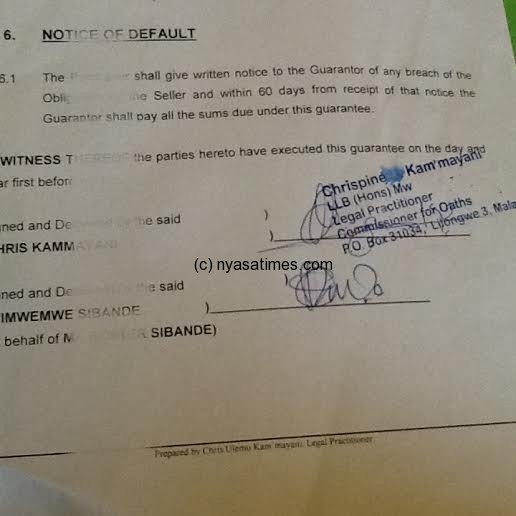 The lawyer signed the documents[/caption]
President of the Malawi Law Society Suzi Banda said the rise in unethical behaviour of some lawyers coupled with dishonesty is troubling the law body.
This is after
The lawyer signed the documents[/caption]
President of the Malawi Law Society Suzi Banda said the rise in unethical behaviour of some lawyers coupled with dishonesty is troubling the law body.
This is after 
 President Mutharika witness Tobacco Auctioning in Progress at Lilingwe Auction Floors to mark the official opening of 2016 Tobacco Marketing Season (C) Stanley Makuti[/caption]
[caption id="attachment_107572" align="alignright" width="600"]
President Mutharika witness Tobacco Auctioning in Progress at Lilingwe Auction Floors to mark the official opening of 2016 Tobacco Marketing Season (C) Stanley Makuti[/caption]
[caption id="attachment_107572" align="alignright" width="600"]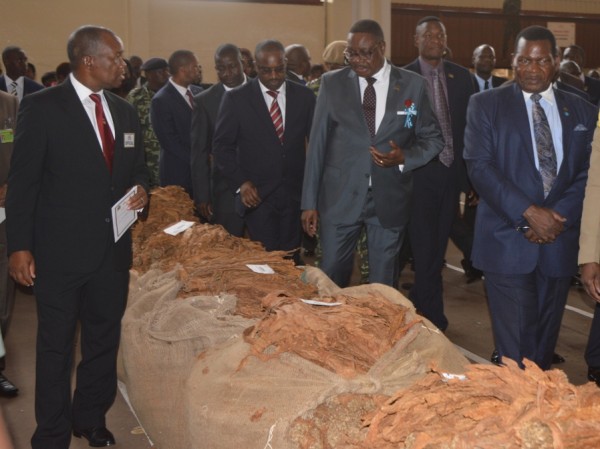 President Arthur Peter Mutharika witness Tobacco Auctioning in Progress at Lilingwe Auction Floors to mark the official opening of 2016 Tobacco Marketing Season (C) Stanley Makuti[/caption]
However, Mutharika warned the buyers against giving cosmetic prices on first days of the masket, saying ordinary poor Malawians need to reap from their year- long sweat.
"We want fair prices. Every year we discuss tobacco prices which you implement on first day and abandon later. This year we asked you to come up with the minimum prices which you did and we hope you will not abandon the prices," said Mutharika.
Added Mutharika: "Listen to us, listen to our cries. You have to listen to the plight of our farmers."
He said the government will not sit back and watch as the buyers exploited tobacco farmers saying he would be visiting the markets without any warning or announcements to make sure the buyers stuck to their promises of good prices.
The President also reminded the buyers that the government would not tolerate tax evasions and would severely with such companies involved in tax evasions.
He also advised the farmers to offer good leaf for sale if buyers are to offer good prices saying the 34 per cent rejection rate of tobacco means some farmers continued to sell poor leaf or were still placing objects in their bales to cheat tobacco buyers.
Mutharika also said its high time Malawi diversified its cash crops as tobacco is facing huge challenges because of unreliable weather and anti smoking campaigns.
The President said farmers were labouring more and earning less hence the need to tackle the issues with strong regulation of the tobacco industry to reduce the cost of production and the cost of fertilizer.
He said government’s solution was to bring home investors in local fertiliser manufacturing and create more jobs, save the country’s forex and stop importing fertilizer from other countries.
Chairperson for Auction Holdings Limited (AHL) Group, Foster Mulumbe, concurred with Mutharika describing tobacco as the biggest foreign exchange for the country.
He said AHL group was more than prepared to efficiently handle tobacco sales for this year in all its market points.
“We have done all the infrastructure upgrades to ensure a smooth flow of operations and that the industry’s taxes are appropriately channelled to government,” said Mulumbe.
The tobacco prices ranged from 50 cents to US$ 140 to US$ 184 per kilogram bringing smiles on the faces of the farmers although most tobacco has been sold at US$80.
President Arthur Peter Mutharika witness Tobacco Auctioning in Progress at Lilingwe Auction Floors to mark the official opening of 2016 Tobacco Marketing Season (C) Stanley Makuti[/caption]
However, Mutharika warned the buyers against giving cosmetic prices on first days of the masket, saying ordinary poor Malawians need to reap from their year- long sweat.
"We want fair prices. Every year we discuss tobacco prices which you implement on first day and abandon later. This year we asked you to come up with the minimum prices which you did and we hope you will not abandon the prices," said Mutharika.
Added Mutharika: "Listen to us, listen to our cries. You have to listen to the plight of our farmers."
He said the government will not sit back and watch as the buyers exploited tobacco farmers saying he would be visiting the markets without any warning or announcements to make sure the buyers stuck to their promises of good prices.
The President also reminded the buyers that the government would not tolerate tax evasions and would severely with such companies involved in tax evasions.
He also advised the farmers to offer good leaf for sale if buyers are to offer good prices saying the 34 per cent rejection rate of tobacco means some farmers continued to sell poor leaf or were still placing objects in their bales to cheat tobacco buyers.
Mutharika also said its high time Malawi diversified its cash crops as tobacco is facing huge challenges because of unreliable weather and anti smoking campaigns.
The President said farmers were labouring more and earning less hence the need to tackle the issues with strong regulation of the tobacco industry to reduce the cost of production and the cost of fertilizer.
He said government’s solution was to bring home investors in local fertiliser manufacturing and create more jobs, save the country’s forex and stop importing fertilizer from other countries.
Chairperson for Auction Holdings Limited (AHL) Group, Foster Mulumbe, concurred with Mutharika describing tobacco as the biggest foreign exchange for the country.
He said AHL group was more than prepared to efficiently handle tobacco sales for this year in all its market points.
“We have done all the infrastructure upgrades to ensure a smooth flow of operations and that the industry’s taxes are appropriately channelled to government,” said Mulumbe.
The tobacco prices ranged from 50 cents to US$ 140 to US$ 184 per kilogram bringing smiles on the faces of the farmers although most tobacco has been sold at US$80.

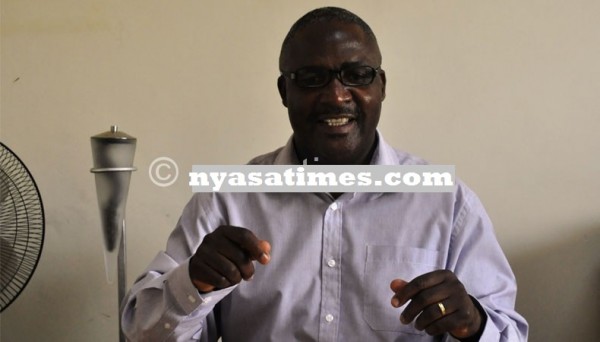 OXFAM Country Director,John Makina[/caption]
[caption id="attachment_107620" align="alignright" width="600"]
OXFAM Country Director,John Makina[/caption]
[caption id="attachment_107620" align="alignright" width="600"] Drought-hit Malawi declares national disaster[/caption]
Oxfam, Concern Universal, Concern Worldwide, Save the children and Goal Malawi say in a statement Mutharika's declaration is the much needed acknowledgement of the problem.
"The statement should send a strong signal to donors to act quickly. International community should act swiftly and decisively on the government's declaration of emergency where people are facing worsening hunger because of El Nino related drought and nationwide crop failure,” reads the statement in part signed by John Makina, country director of Oxfam.
The groups say Malawians should not have to go to bed hungry every night.
"All of us, government, NGOs and international donors need to work together to ensure everyone has access to enough food for themselves and their families” says Makina.
President Mutharika on Wednesday said there is now enough maize in all Admarc depots but the reality on the ground shows that accessing maize in Admarc depots in Blantyre, Lilongwe and Mzuzu is still a hussle as traders continue to sell the grain at very high prices despite the fact that this is a harvesting period.
Government says it is expected that Malawi will have 2.4 million tonnes of maize this year out of the 3 million metric tonnes needed, saying this year food shortage will be worse than last year when Malawi had 2.7 million metric tonnes.
Mozambique has issued a red alert on Wednesday on hunger whilst rich South Africa says it is experiencing the worst food shortages in recent memory.
Drought-hit Malawi declares national disaster[/caption]
Oxfam, Concern Universal, Concern Worldwide, Save the children and Goal Malawi say in a statement Mutharika's declaration is the much needed acknowledgement of the problem.
"The statement should send a strong signal to donors to act quickly. International community should act swiftly and decisively on the government's declaration of emergency where people are facing worsening hunger because of El Nino related drought and nationwide crop failure,” reads the statement in part signed by John Makina, country director of Oxfam.
The groups say Malawians should not have to go to bed hungry every night.
"All of us, government, NGOs and international donors need to work together to ensure everyone has access to enough food for themselves and their families” says Makina.
President Mutharika on Wednesday said there is now enough maize in all Admarc depots but the reality on the ground shows that accessing maize in Admarc depots in Blantyre, Lilongwe and Mzuzu is still a hussle as traders continue to sell the grain at very high prices despite the fact that this is a harvesting period.
Government says it is expected that Malawi will have 2.4 million tonnes of maize this year out of the 3 million metric tonnes needed, saying this year food shortage will be worse than last year when Malawi had 2.7 million metric tonnes.
Mozambique has issued a red alert on Wednesday on hunger whilst rich South Africa says it is experiencing the worst food shortages in recent memory.

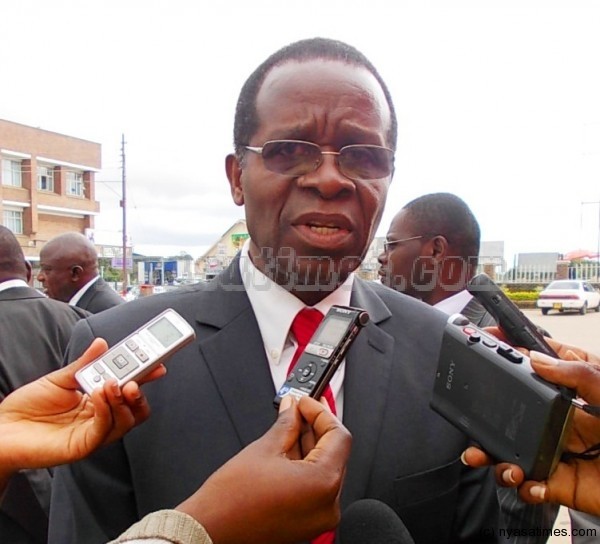 Katsonga: Hostile economy not good for business in Malawi[/caption]
"The economy is so unstable and not friendly for business," Katsonga, proud owner and founder of Agma and Axa Bus company said.
He said this on Tuesday during the presentation of awards to long working employees.
Katsonga said the business climate has been hostile since the dawn of multiparty politics has worsened in the past two years or so because of the tumbling economy.
"Any economic shocks results in the depreciation of the kwacha making investment in Malawi very risky.”
He said the kwacha has severely tumbled against the dollar saying in 1994, the kwacha was trading K4 only against the dollar but now it is trading K700 from K1000 just a few months ago.
Katsonga also said Malawi lacks skilled manpower to grow the economy.
Labour minister Henry Mussa conceded the poor economy has affected all spheres of life including the media.
Recently Times Group laid off over 40 members of staff after giving notice in the media.
Mussa said all companies wishing to retrench workers needs to follow the law by informing the ministry which will investigate if indeed excess workers would hamper the growth of such e company.
He said FDH managing director Thom Mpinganjira personally presented the case of retrenchment at Malawi Savings Bank to ministry officials.
"We were convinced that there was need for the retrenchment of the 600 workers because of duplication of positions following the merger of MSB and FDH banks," he said.
FDH head of marketing Sobhuza Ngwenya said the retrenchment will make MSB more effective and efficient as management wants to float it on Malawi Stock Exchange so that Malawians can buy shares from the once state bank.
Katsonga: Hostile economy not good for business in Malawi[/caption]
"The economy is so unstable and not friendly for business," Katsonga, proud owner and founder of Agma and Axa Bus company said.
He said this on Tuesday during the presentation of awards to long working employees.
Katsonga said the business climate has been hostile since the dawn of multiparty politics has worsened in the past two years or so because of the tumbling economy.
"Any economic shocks results in the depreciation of the kwacha making investment in Malawi very risky.”
He said the kwacha has severely tumbled against the dollar saying in 1994, the kwacha was trading K4 only against the dollar but now it is trading K700 from K1000 just a few months ago.
Katsonga also said Malawi lacks skilled manpower to grow the economy.
Labour minister Henry Mussa conceded the poor economy has affected all spheres of life including the media.
Recently Times Group laid off over 40 members of staff after giving notice in the media.
Mussa said all companies wishing to retrench workers needs to follow the law by informing the ministry which will investigate if indeed excess workers would hamper the growth of such e company.
He said FDH managing director Thom Mpinganjira personally presented the case of retrenchment at Malawi Savings Bank to ministry officials.
"We were convinced that there was need for the retrenchment of the 600 workers because of duplication of positions following the merger of MSB and FDH banks," he said.
FDH head of marketing Sobhuza Ngwenya said the retrenchment will make MSB more effective and efficient as management wants to float it on Malawi Stock Exchange so that Malawians can buy shares from the once state bank.

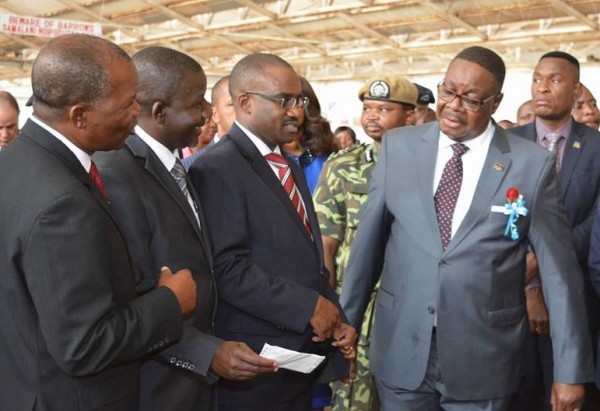 President Mutharika at tobbaco market[/caption]
[caption id="attachment_107629" align="alignright" width="600"]
President Mutharika at tobbaco market[/caption]
[caption id="attachment_107629" align="alignright" width="600"]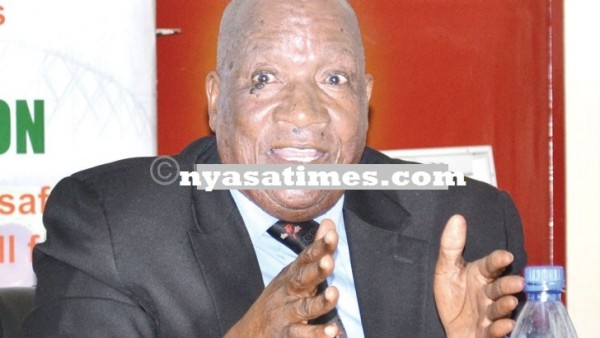 Kapichira- Banda: Auction tobacco prices depressed[/caption]
FUM president Alfred Kapichira Banda said tobacco farmers will not be able to repay their farm input loans.
"These poor prices coupled with the appreciation of the kwacha will diminish projected earnings of the farmer," he said.
Kapichira Banda said the tobacco farmer was growing tobacco when the kwacha was hovering around K1000 to a dollar saying which means they took the agricultural loan when the kwacha was trading at K1000 to a dollar.
However he said they are selling the tobacco when the kwacha is hovering around K600 to a dollar.
"This means the farmers will have losses, the difference is just big. Then we have these low prices of 80 cents, this will make the life of a farmer unbearable. The appreciation of the kwacha has killed the prices," he said.
Alfred Changaya, chief executive officer of Tobacco Control Commission described the prices on the opening day of the auction floors on Thursday as average.
"It has been an average day, there have been a few rejections because of the quality of the leaf,” said Changaya.
Drama was not only on the prices but even the official opening of the floors as President Aurther Peter Mutharika (APM) forgot what he was there for.
"Ndikunena kuti tsopano lero ndatsegula ujeni...hahahaha ndatsegula ujeni" then the Democratic Progressive Party women started singing signalling the end of the function but he came back shouting "let me finish," then said in English that the tobacco market was now officially open.
Kapichira- Banda: Auction tobacco prices depressed[/caption]
FUM president Alfred Kapichira Banda said tobacco farmers will not be able to repay their farm input loans.
"These poor prices coupled with the appreciation of the kwacha will diminish projected earnings of the farmer," he said.
Kapichira Banda said the tobacco farmer was growing tobacco when the kwacha was hovering around K1000 to a dollar saying which means they took the agricultural loan when the kwacha was trading at K1000 to a dollar.
However he said they are selling the tobacco when the kwacha is hovering around K600 to a dollar.
"This means the farmers will have losses, the difference is just big. Then we have these low prices of 80 cents, this will make the life of a farmer unbearable. The appreciation of the kwacha has killed the prices," he said.
Alfred Changaya, chief executive officer of Tobacco Control Commission described the prices on the opening day of the auction floors on Thursday as average.
"It has been an average day, there have been a few rejections because of the quality of the leaf,” said Changaya.
Drama was not only on the prices but even the official opening of the floors as President Aurther Peter Mutharika (APM) forgot what he was there for.
"Ndikunena kuti tsopano lero ndatsegula ujeni...hahahaha ndatsegula ujeni" then the Democratic Progressive Party women started singing signalling the end of the function but he came back shouting "let me finish," then said in English that the tobacco market was now officially open.
